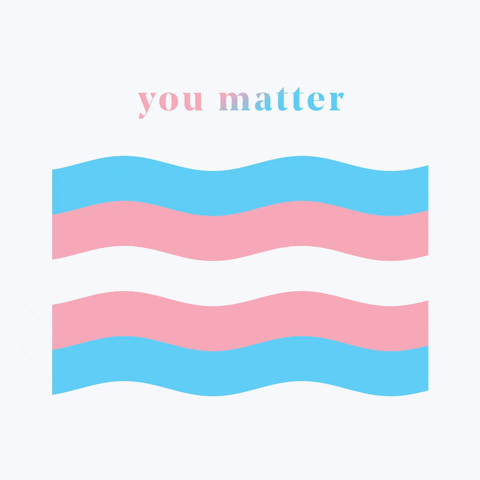Positionality statement: This post is written by Ruby Millen, a second-year at UMBC studying Anthropology and Art History. I am a transmasculine person and use he/they/it pronouns. At the Women’s Center, I facilitate Spectrum which is a discussion group for members who identify as trans, genderqueer, gender fluid, outside of the gender binary, and/or those who are questioning their gender identity. Lately, I have been unpacking a lot of the complex feelings I have regarding my gender, and want to share my reflections here. In my blog, I hope to depict the nuances of being Trans and highlight how vastly experiences can vary.
 Image description: a bare chest with a top surgery scar with the text “pretty boy” and “he/they” adjacent to the image. The side profile of a person’s face with floral imagery, butterflies, and a trans pride flag on the bottom.
Image description: a bare chest with a top surgery scar with the text “pretty boy” and “he/they” adjacent to the image. The side profile of a person’s face with floral imagery, butterflies, and a trans pride flag on the bottom. I am a transmasculine person. It would feel wrong if I was referred to as a “man” but I am fine being a guy, sometimes, a boy or a dude. People do not seem to understand me because I use he/they pronouns and “look like a girl,” but what does it mean to “look like a girl?” Am I labeled a girl because I like makeup, because I wear skirts and dresses? Maybe, but I am also treated like a woman when my hair is buzzed and I am wearing men’s jeans and a baggy t-shirt. So, what is it? Is it because of my chest? I do not know for certain if I want top surgery yet. I think I would feel comfortable having a flat chest, although a lot of what I detest about my boobs is the fact that men, especially older men, stare at them, with no regard for the fact that I have eyes that can see them, or that I am uncomfortable. I can feel the dehumanizing stare of predatory men often, and it is not limited to my chest. This body is the vessel I was given. It is sick that I detest parts of my body not because there is anything wrong with them, but because I feel vulnerable when I get too much of the wrong attention. It is far too normalized and socially acceptable for men to behave like this. Their uncomfortable looks and interest in me alienates me further from my body and makes me feel like an object, not a person.
What a privilege it is to be a man. I could “look like a man” if I got top surgery and went on Testosterone, but I would have to over-explain every personal choice I make in regard to my gender presentation to my family for them to treat me like a human and not a nuisance. I would have to endure the awkward in-between phases that make people uncomfortable.
“I would have to be extra careful only to reveal my transness when it is safe to avoid abuse and harm. Cisgender men do not carry this burden. They can exist. They do not have to worry about the government trying to eradicate them.”
They can speak, be seen, and be heard without being interrupted mid-sentence, without the inevitable “but” that stifles my voice. I crave to be treated with respect and dignity. I crave to be treated like a man. Dignity is not gendered and should be innate, yet in reality, cisgender men are treated with dignity as a standard, while everyone else is not. It seems like dignity is allocated on the basis of masculinity. The closer and more conforming someone is to patriarchal standards, the more dignity they receive. This should not be the case. As a transmasculine person who yearns to be seen as an effeminate boy, I should not have to change what makes me feel euphoric to accommodate others, much less cisgender people. And I certainly should not have to conform to societal standards of masculinity to be valid in my transness.
As much as I have criticized men, they are not a monolith. Trans men of course are encompassed by the word man. The version of masculinity that feels most affirming to me is inherently tied to my transness. I look towards Trans men to model masculinity. While exploring my gender identity, one of the most healing experiences for me has been platonic relationships with good men.
Men that listen to me without formulating their response while I talk. Men that invite me to play video games with them and encourage me to give sporting events a try despite my resistance. Men that love and respect women. Men that let me paint their nails. Men that express their emotions and can be vulnerable. Men that would never use the word “gay” as an insult. Men that are gay. I treasure these men and what they have taught me about what masculinity should be.
Any of the absolute-sounding statements I have made are my experiences. I hope my thoughts push you to question whether the assumptions you make about another person are fair. To question why you made them in the first place and deconstruct harmful beliefs you have been socialized with. If facilitating Spectrum has taught me anything it is that assumptions are harmful and so often incorrect. Strive to treat other people with grace and openness. With good intentions, it is so easy to form meaningful relationships with Transgender people even if you do not fully understand their gender identity. Listening to those around you and being a safe space goes a long way. Every human being deserves to be treated with dignity and respect. Gender should not have any effect on how much dignity or respect someone deserves. Love one another. Support one another. Ask curious questions. Be aware of your language. Do not be that professor that is gripping onto the terms “female” and “male” for dear life. Switch these out for more specific terms. Is this person a man, a woman, or something else? Listen to trans people, and whenever possible give them the benefit of the doubt. Being trans is a lot and it is not a choice.








